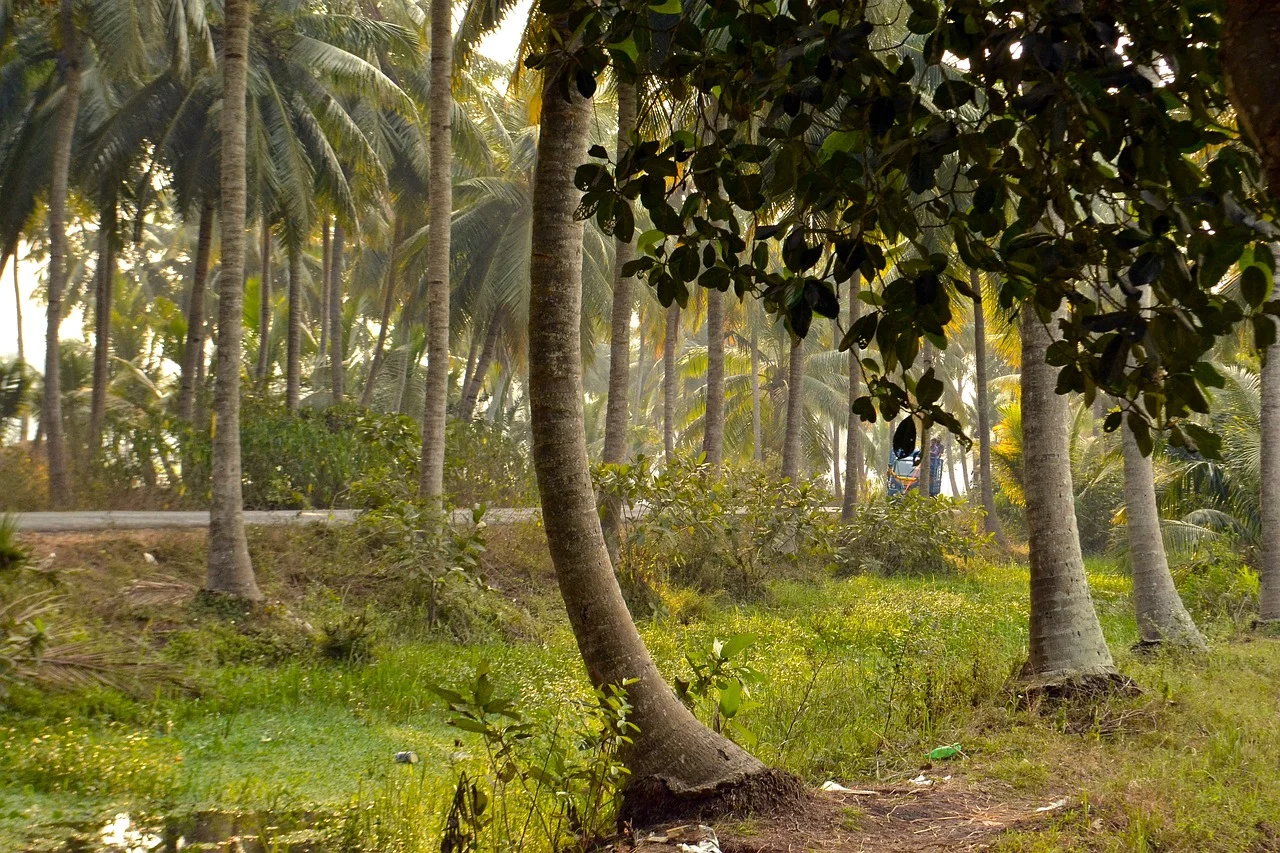In Bangalore, a usual morning is marked by the constant honking of vehicles, the rumble of motorcycles passing by, the lively calls of street vendors, and the unique sounds of construction work happening somewhere in the background.
Dealing with the ongoing headache and frustration, a significant downside of residing in such an environment is that it might make you strongly desire to leave everything behind and seek an escape. This sentiment is precisely what inspired a mother-daughter duo from Bengaluru to establish the perfect haven for those seeking to get away from the city’s hustle and bustle.
“We aim to provide people with a unique and refreshing experience away from the city. Our goal is to encourage natural farming, veganism, and a healthy lifestyle,” explains Christina Ajith (23).

Known as The Lilac Farm, this farm stay near Somashettyhalli in Bengaluru is a sanctuary for those who love animals and nature. Visitors to the farm engage in a variety of activities, from participating in farming tasks to enjoying mud baths and savoring wholesome vegan meals.
Christina, along with her mother, Anitha Ajith (56), practices natural farming on their 13-acre farm, cultivating a diverse range of produce. They grow vegetables such as tomatoes, chillies, capsicum, green papaya, and brinjals, as well as fruits like bananas, gooseberries, and mangoes. The farm also boasts vibrant flowers like butterfly peas, hibiscus, and lilac.
Interestingly, what is now a vegan farm initially started as a family-owned dairy farm, lasting for more than a decade.
From Childhood Fields to Lilac Blooms
Anitha Ajith fondly recalls her childhood, which unfolded in a picturesque village in Kerala. “I was born and brought up in a village where nature was my constant companion,” she reflects. Her formative years were immersed in the simple and fulfilling lifestyle of the village, where the community shared a strong bond with the land. “Back then, everyone in our village embraced the culture of growing their own food,” Anitha reminisces.

Despite the busy schedules of her working parents, there was a commitment to cultivating a variety of vegetables and fruits. Anitha paints a vivid picture of a self-sustaining household, saying, “Even though both my parents had jobs, they managed to dedicate enough time to grow our own food. We had different types of vegetables and fruits flourishing in our backyard.” The family’s self-sufficiency extended to livestock, with Anitha adding, “We even had a local breed cow at home, ensuring a constant supply of milk. Chickens were part of our home too, taking care of the egg supply.”
However, life took a significant turn for Anitha after her marriage, leading her to relocate to bustling Bangalore City. Reflecting on this transition, she notes, “Life in the city was a complete U-turn from the village life I knew. Suddenly, anything we wanted, whether it was a humble curry leaf or a green chili, had to be purchased from a shop.” This shift marked the beginning of Anitha’s journey from the rustic charms of her village to the fast-paced urban lifestyle of Bangalore.
The arrival of two children brought about a profound shift in Anitha’s perspective. As she served meals to her little ones, a nagging inner voice began to question the origin and cultivation practices behind the food on their plates. “I found myself asking, ‘Do you know where this food comes from? Who grew it and how? What chemicals and pesticides were used?'” Anitha reflects on the uncertainty that clouded her understanding of the food she provided for her family.

In stark contrast to her upbringing, where her mother instilled confidence in the source and quality of their food, Anitha found herself grappling with uncertainty as a mother. “My mother was very certain about what she was providing for us,” Anitha recalls. However, the same certainty eluded her as a mother, prompting her to ponder, “Now, as a mother myself, I don’t have that assurance about what I’m giving to my children. This realization compelled me to contemplate the need to grow my own food.”
Anitha’s determination to take control of her family’s food sources led her to embark on a journey that began with terrace gardening. However, she soon realized that terrace gardening alone couldn’t fulfill her broader goals. The decision to acquire land became the next logical step. In 2010, the family made a pivotal investment, purchasing the land that would later become The Lilac Farm. Yet, the initial stages were riddled with challenges, including weather fluctuations, water scarcity, and soil quality concerns.

Undeterred by these obstacles, the family persevered. Anitha recounts, “It took several years, but we were committed to overcoming the challenges. We planted an abundance of trees to enhance sustainability and resilience on the land.” This strategic approach not only contributed to the farm’s ecological balance but also set the stage for a more diverse and self-sustaining agricultural venture.
To further enrich their efforts, Anitha expanded beyond traditional farming. “We ventured into dairy farming, introducing cows to the landscape,” Anitha shares. The farm evolved into a multifaceted space, accommodating not just dairy cows but also sheep, goats, and chickens.
Transition to a lifestyle of mindful living
Christina, coming from a typical Malayali family, used to be a hardcore non-vegetarian, relishing dishes like chicken and mutton curries and fish fingers.
However, everything changed in 2019 when she received a life-altering diagnosis—Lupus, an autoimmune disease. The doctors recommended giving up animal products for a more natural lifestyle.
In just two months, Christina and her family made the switch to veganism. Reflecting on this shift, she shares, “My family and I were avid meat lovers, but after my Lupus diagnosis, we became aware of the impact of animal products on health and the environment. Choosing veganism became our way of embracing natural living and encouraging others to do the same.”

On their Dairy Farm, Christina and her family were determined to transform it into a vegan haven. “We retained weaker and older cows that needed care, while the others were responsibly sold to other dairy farm owners,” she explains, highlighting their commitment to creating a space aligned with their newfound values.
Sharing the inspiration behind The Lilac Farm, Christina explains, “The idea for the farm stay dawned on us when we began residing here. I have a passion for cooking, and my mother has always been enthusiastic about farming. So, we decided to blend our skills, giving birth to The Lilac Farm.”
For Anitha, The Lilac Farm presented an ideal chance to embrace the natural lifestyle she had always yearned for. Recounting her roots, she says, “I was born into a family of farmers in Kerala. Most of my early years were spent eating food cultivated on our own land. As a mother, my desire was to provide my children with natural and healthy food. However, that became challenging when we lived in the city. The creation of The Lilac Farm turned out to be the perfect opportunity for me to live the life I had always envisioned.”
Also Read: How They Transformed Ancestral Land into an Enchanting Monsoon Haven: The Story of Mohraan Farms
Discussing their shift to veganism, Christina shares, “At first, it was a bit challenging. Being Malayalis, we’ve always enjoyed non-vegetarian dishes. However, as we delved into it, we began to recognize the environmental and ethical dimensions of adopting a vegan lifestyle. What initially started for health reasons evolved into a deeper understanding. It felt contradictory to label ourselves as animal lovers while also running a dairy farm. Eventually, it became more of a conscious choice rather than a health-related restriction.”
Embracing a harmonious existence with nature
Regarding the creation of the retreat, Christina shares, “Originally, my mother had the idea of constructing mud houses. However, we decided to repurpose the existing cow sheds and transform them into rooms. Every element used in crafting these guest rooms, including windows, tiles, and doors, is secondhand. The tiles, with their mismatched shapes and sizes, come from various junkyards and scrap dealers.”
At present, The Lilac Farm provides a range of services and retreats. Anitha details, “We organize health retreats, yoga retreats, corporate outings, and even school excursions. We’ve welcomed numerous schools, offering students a firsthand look at how food is grown. It’s an educational experience, helping them understand that the food on their table doesn’t just come from a supermarket but originates in a field. All these activities are designed to connect people with nature.”

The farm not only welcomes guests for retreats but also hosts sustainable and vegan birthday parties, with plans to expand to sustainable weddings in the future. Christina shares, “Our birthday parties are completely free of plastic, featuring naturally grown food. All decorations are crafted with flowers and leaves sourced directly from our farm.”
In addition to hosting events, the duo produces cocktail mixes and soft drinks. Christina explains, “We create various flower drinks using hibiscus and butterfly pea flowers grown right here on the farm, all without using any preservatives.”
Upon arrival at the farm, guests are treated to herbal teas and fruit juices, and they have the opportunity to experience a mud pond, a star-gazing deck, and indulge in healthy vegan meals.
Sharing her experience at the farm, Pranjul Bhadauria expresses, “If you’re seeking an escape from work life and a chance to connect with Mother Earth, it’s the perfect place. The ambiance, the vegan food, and the farms create a beautiful, heavenly environment.”

Looking ahead, the dynamic mother-daughter team expresses their vision, saying, “Our goal is to spread awareness about veganism far and wide. Many still view veganism as a foreign concept, not realizing that in most Indian cuisine, our food is already vegan if we exclude ghee. From dosas and idlis to sambar, our traditional dishes are all vegan.”
Anitha, emphasizing their commitment to nature-friendly living, shares, “We believe in living in harmony with nature and minimizing harm to the environment in our daily lives. As a mother, I aspire to help other mothers and individuals understand the benefits of veganism and cultivating natural food.”
Since opening their farm to guests in 2021, the duo has welcomed nearly 1,000 people. The cost of a stay on the farm begins at Rs 2,000 for a double room, inclusive of meals, with variations depending on the chosen package.
Book your stay here









